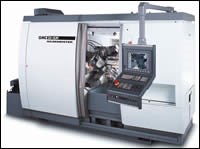CNC Multi-Spindle Offers New Feature Combos For Lower Cost Per Part
Not too long ago, if cycle time was the primary consideration when buying a new multi- spindle machine, the choice was automatic—cam automatic, that is. Today, CNC multi-spindle machines offer cycle times comparable to those for cam automatics and a great deal more. Builders of CNC multi-spindles have discovered more ways to computerize their machines, providing packages of features that raise their productivity to a new level.
Not too long ago, if cycle time was the primary consideration when buying a new multi- spindle machine, the choice was automatic—cam automatic, that is. Today, CNC multi-spindle machines offer cycle times comparable to those for cam automatics and a great deal more. Builders of CNC multi-spindles have discovered more ways to computerize their machines, providing packages of features that raise their productivity to a new level.
A case in point is the GMC ISM series of CNC multi-spindle screw machines introduced by DMG America Inc. (Schaumburg, Illinois). The six-spindle series consists of three models, the GMC 20, 35 and 55, which accommodate bar diameters to 0.78 inch, 1.4 inches and 2.2 inches respectively.
Each of the six spindles is independent of the others and can be programmed separately. That means that the rotating speed of the spindle at each station can be optimized for the material being machined and the type of operation being performed. The feature provides much greater control of surface finish, accuracy of machined features and part-to-part consistency than was possible with earlier multi-spindle machines where rotating speed, which is the same for all spindles, must necessarily be compromised.
Computer control of the spindles of the ISM machine is not limited to rotating speed. It also includes control of the spindle’s C axis, permitting a spindle stop or positioning at any desired angular position for operations such as cross-drilling, slotting and flat milling.
The series also offers impressive acceleration and braking, reducing the amount of time it normally takes for a machine to ramp up to desired cutting speed. For example, the Model GMC 20 can reach its maximum spindle speed of 8,000 rpm in just 1.2 seconds and just as quickly come to rest. Getting the tools in and out of the cut in less time reduces the overall cycle time for the part being machined.
The CNC multi-spindle series also benefits from the faster processing times of today’s computers. It employs the Siemens 840D CNC with the Microsoft Windows operating system. According to DMG, the markedly faster processor times of the Intel Pentium-based computer provides a more than 100 percent increase in the control’s performance.
Programming software is an equally important part of the package. The newly developed MF Programmer 3D software runs on the CNC, but it will probably be used more frequently for off-line programming. It shows the CNC multi’s machining area in every detail. After the geometry of the workpiece to be machined has been entered, it can be displayed on the screen as a 3D model. Following a step-by-step, on-screen menu, the programmer enters simple descriptions of the machining operations required for the part. Working with the information provided by the programmer, the software automatically generates the programs for the individual machining operations.
Once the part has been completely described, a 3D real-time simulation starts up, showing all of the tool movements. Viewing the simulation, the programmer can see whether the individual machining steps are properly distributed. If they are not, the operator can shift any desired operation to another work station with the click of a mouse.
After the operations have been balanced and the cycle time has been optimized, a collision control feature is activated. This program check flags any problems and enables the programmer to make the needed corrections. The feature helps avoid damage to the machine and tooling and the subsequent downtime resulting from a collision. Finally, the optimized machining program is downloaded to the machine on the shop floor.
The market has been slow to accept the CNC multi-spindle. Its high cost may be a factor. But the improvements incorporated in the current crop of machines such as the ISM series result in faster cycle times, shorter setup times and improved flexibility, making CNC multis more economical on a cost-per-part basis than ever before.
Related Content
CAM-Driven Lathe Questions
There can be hidden issues using legacy cam-driven lathes that can be overcome using new CNC technology. Here are three to keep in mind.
Read MoreIndex Corp. Turnkey Solutions Provide Flexible Manufacturing Performance
IMTS 2024: Index's C200 FANUC features powerful twin spindles that achieve rapid material removal.
Read MoreStriving for Faster Changeovers for Multispindles
A multispindle platform designed to combine the high production speed of a cam-driven machine with the precision and repeatability of CNC also includes technology to speed set ups for new jobs.
Read MoreMethods Multitasking Machine Reduces Cycle Times
Methods Machine Tools Inc. introduces Nakamura-Tome’s WY-100V two-turret, twin-spindle precision CNC multitasking lathe to the U.S. market.
Read MoreRead Next
Do You Have Single Points of Failure?
Plans need to be in place before a catastrophic event occurs.
Read MoreSeeing Automated Workpiece Measurement in Real Time
User-friendly inspection software for CNC machining centers was shown at IMTS 2024 monitoring measurements between and after machining while performing SPC based on recorded measurement values.
Read MoreA Tooling Workshop Worth a Visit
Marubeni Citizen-Cincom’s tooling and accessory workshop offers a chance to learn more about ancillary devices that can boost machining efficiency and capability.
Read More










.jpg;maxWidth=300;quality=90)











